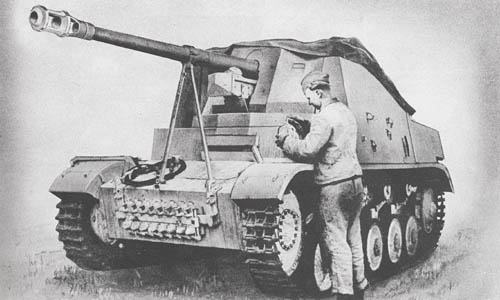
Produced in 1942. This antitank equipment was encountered in the battle of Tunisia. It is composed of the 7.5 cm antitank gun mounted on a Pz. Kpfw. II chassis and its road performance will closely follow that of the Pz. Kpfw. II tank.
The gun, which retains its original shield, recoil system, traversing and elevating gears, is mounted on a platform high on the hull and fires forward. A protective shield 10 mm thick, which slopes away to the rear of the chassis, has been provided. The shield is nearly rectangular except for a projecting portion in front of the gun mounting itself and the top and back are apparently open. The traverse of the gun is limited due to the gun shield fouling the protective shield. A barrel support for travelling is fitted in front of the hull.
The piece, 134 inches in length, is a monobloc type, semi-automatic, with horizontal sliding breech. It consists of barrel with shoes; breech ring with locking ring; breech block with firing mechanism; semi-automatic gear and muzzle brake. The recoil mechanism is comprised of a buffer cylinder, filled with a mixture of glycerine and distilled water, mounted in the cradle and secured by a nut to the front end plate. The piston rod, which is connected to the gun lug, is hollow, and is fitted with a bronze piston head. Ports are drilled in the conical part of the piston. A tapered rod is screwed into the front plug of the cylinder and projects into the hollow piston rod. During recoil the piston moves to the rear and the oil is forced from the buffer cylinder through the ports in the piston and hence through the annular space between the tapered rod and a bushing fitted in the piston. Recoil control is effected by a brass control plunger screwed to the end of the tapered rod. The recuperator is hydro-pneumatic.
SPECIFICATIONS
| Weight | 10 tons | |||||||||||||||||||||||||||||||||||||||||||
| Length | 15 ft., 2¾ ins. | |||||||||||||||||||||||||||||||||||||||||||
| Width | 7 ft., 4 ins. | |||||||||||||||||||||||||||||||||||||||||||
| Height | 6 ft., 5¾ ins. | |||||||||||||||||||||||||||||||||||||||||||
| Ground clearance | 13 ins. | |||||||||||||||||||||||||||||||||||||||||||
| Tread centers | 6 ft., 2 ins. | |||||||||||||||||||||||||||||||||||||||||||
| Ground contact | 7 ft., 10 ins. | |||||||||||||||||||||||||||||||||||||||||||
| Width of track | 11 1/8 ins. | |||||||||||||||||||||||||||||||||||||||||||
| Pitch of track | 3 5/8 ins. | |||||||||||||||||||||||||||||||||||||||||||
| Track links | 105 | |||||||||||||||||||||||||||||||||||||||||||
| Fording depth | 3 ft. | |||||||||||||||||||||||||||||||||||||||||||
| Theoretical radius of action | ||||||||||||||||||||||||||||||||||||||||||||
| Roads | 118 miles | |||||||||||||||||||||||||||||||||||||||||||
| Cross-country | 78 miles | |||||||||||||||||||||||||||||||||||||||||||
| Speed | ||||||||||||||||||||||||||||||||||||||||||||
| Roads | 25 m.p.h. | |||||||||||||||||||||||||||||||||||||||||||
| Cross-country | 12 m.p.h. | |||||||||||||||||||||||||||||||||||||||||||
| Armor | ||||||||||||||||||||||||||||||||||||||||||||
| Front plate | 15 + 20 mm | |||||||||||||||||||||||||||||||||||||||||||
| Sides | 15 mm | |||||||||||||||||||||||||||||||||||||||||||
| Armament | 7.5 cm Pak 40 A.T. gun | |||||||||||||||||||||||||||||||||||||||||||
| Max. effective range | 3200 yards | |||||||||||||||||||||||||||||||||||||||||||
| M.V. (Wt. 12.6 lb.) | H.E. 1800 f.s. | |||||||||||||||||||||||||||||||||||||||||||
| M.V. (Wt. 15 lb.) | A.P.C. 2525 f.s. | |||||||||||||||||||||||||||||||||||||||||||
| Elevation | -5° to +22° | |||||||||||||||||||||||||||||||||||||||||||
| Traverse | 65° | |||||||||||||||||||||||||||||||||||||||||||
|
||||||||||||||||||||||||||||||||||||||||||||
| Ammunition | ||||||||||||||||||||||||||||||||||||||||||||
| Engine | Maybach HL 62 TRM, 140 h.p. | |||||||||||||||||||||||||||||||||||||||||||
| Transmission | Crash-type gear box, 6 fwd. speeds, 1 reverse | |||||||||||||||||||||||||||||||||||||||||||
| Steering | Epicyclic clutch brake | |||||||||||||||||||||||||||||||||||||||||||
| Crew | Probably 4 | |||||||||||||||||||||||||||||||||||||||||||
German: p. 11